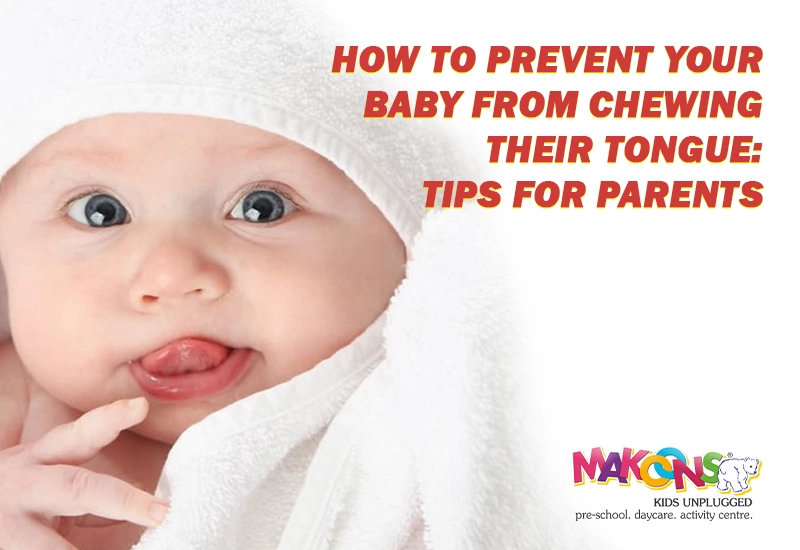As a new parent, you can find your child acting in different ways that make you wonder whether they are typical or cause for concern. One such habit that occasionally worries parents unfamiliar with newborn development trends is baby tongue biting. If you have been wondering, “Why do babies chew their tongue?” or looking for a “newborn tongue chewing solution,” this thorough guide will help you comprehend this typical activity and learn sensible approaches to handle it as needed.
Understanding Tongue Chewing in Babies
Actually, throughout the first year of life, infant tongue chewing is really prevalent. When you see your infant eating tongue motions, you should understand that this behavior usually reflects typical developmental milestones rather than an issue needing assistance.
Normal Developmental Reasons for Tongue Chewing
Many incidences of tongue chewing in infants are quite typical and have to do with these developmental aspects:
- Oral Exploration: Babies learn the world by means of their tongues. One of your child’s first tools for learning is just exploring the sensations and capacities of their tongue.
- Teething: Usually occurring between 4-7 months, babies may chew their tongues to ease gum pain. Among the most often occurring reasons for baby chewing tongues are these ones.
- Muscle Development: Babies progressively gain control over their mouth muscles. Chewing and tongue movements assist build these muscles, which will be absolutely vital for eating solid foods and communication.
- Self-Soothing: Some infants find that, like thumb sucking or pacifier use, tongue biting offers comfort.
- Hunger Signaling:When a baby is hungry, they frequently move their tongues—including chewing motions. Part of their pre-feeding pattern, this is a natural feeding trigger.
- Practicing Feeding Skills:Babies naturally hone the tongue motions required for eating as they get ready for finally solid foods. This “practice” resembles tongue biting.
- Discovering Taste Sensations: Babies grow additional taste receptors around three to four months and may chew their tongues as they detect fresh flavors from saliva changes or little differences in breast milk or formula.
- Oral Phase Development:Developmental psychology holds that babies go through an oral phase in which mouth activities predominate in their exploration. One normal developmental stage includes tongue biting.
- Tongue Thrust Reflex:Newborns have a natural response whereby their tongues push forward when something touches their lips. As this reflex vanishes progressively (usually between 4 and 6 months), you may see different tongue motions including chewing as they acquire deliberate control.
When Should Parents Be Concerned?
Although young tongue chewing is usually benign, some circumstances could call for more investigation:
- If tongue chewing causes too much drooling outside what is normal during teething.
- When tongue movements seem forced or unusually repeated,
- Should your baby appear to be uncomfortable biting their tongue?
- When tongue chewing disturbs sleeping or eating,
- If you find strange coloration or texture on your baby’s tongue
Effective Strategies to Address Baby Tongue Chewing
Try these gentle techniques to help infant cease engaging in tongue actions:
1. Provide Appropriate Alternatives
Provide your infant with safe teething toys to satisfy their need to chew and help them to be diverted from tongue chewing. Seek for:
- textured silicone teethers
- Teething rings kept cold rather than frozen
- Supervised use only clean, wet washcloths.
- Particularly made teething mittens
When looking for a newborn tongue chewing solution, these substitutes might especially be quite successful during teething phases.
2. Address Teething Discomfort
Given that teething is the main reason tongue chewing occurs, reducing gum discomfort can help to minimize this behavior:
- Using a sterile finger, gently massage your baby’s gums.
- Apply approved teething gels; first, see your pediatrician.
- If advised by your doctor, make sure suitable painkillers are used;
- try chilled (not frozen) foods for newborns starting solids.
3. Encourage Oral Development Through Feeding Practices
Your baby’s oral development may be affected by your feeding style, which could also help to lessen too strong tongue chewing:
- Make sure breastfed infants have correct latching practices.
- For newborns fed bottles, think about timed feeding techniques.
- Add suitable solid foods at advised times.
- As your child develops, use appropriate utensils.
4. Create Distractions
Gentle distraction can assist when you find babies biting their tongues constantly:
- Play interactive games.
- Introduce fresh sensory encounters.
- Create humorous expressions to draw in their focus.
- Sing songs using animated face emotions.
5. Consider Sensory Needs
As part of sensory processing, some newborns chew their tongues:
- Give distinct tactile sensations all day and introduce different textures during play.
- Think of parent-wear baby-safe chewable jewelry worn during holding.
- Make visual stimulation and distraction sensory bottles.
When to Consult a Healthcare Provider?
While most young tongue biting is innocuous, some situations call for expert advice:
- Should tongue chewing continue to be very strong beyond twelve months,
- When tongue biting affects weight gain or eating,
- Should you observe tongue damage resulting from eating,
- When tongue chewing fits other developmental issues
- If your parental sense tells you something isn’t quite right
Your pediatrician can assess if the behavior fits typical developmental patterns or if it might point to an underlying condition calling for treatment.
Creating a Supportive Environment
Beyond particular methods to solve why do babies chew their tongue, a generally supportive atmosphere might help:
- Maintain Regular Routines:Babies flourish on regular routines of feeding, sleeping, and play.
- Reduce Overstimulation:Some newborns chew their tongues in response to external cues, which helps to calm overstimulation. Establish peaceful times all day.
- Ensure Adequate Sleep: Often, well-rested babies show less stress-related behavior, including too much tongue gnawing.
- Stay attention to hunger cues: sometimes tongue motions signal hunger rather than actual eating behavior.
Conclusion
Recall that most baby chewing tongue activities go away on their own as your child develops. While addressing any discomfort your child may have, concentrate on supporting general growth instead of worrying about how to stop baby from chewing tongue motions totally.
Parenthood is a trip with many times of wondering what is normal and what calls for intervention. Regarding tongue chewing, rest assured most of the time this practice reflects normal exploration and growth rather than cause for worry.
Trust your instincts as a parent; use mild interventions when necessary; and have fun seeing your child explore their environment—tongue chewing and all! You will effectively negotiate this developmental period with care and understanding, adding it to the ever expanding collection of unforgettable events in your parenting path.
Also Read about Baby Skincare Tips – A Guide for Newborn Baby’s Parents
Recall that your pediatrician is your best source for individualized advice catered to your child’s particular needs even if you are unsure about any element of the development of your infant, including tongue chewing habits.


